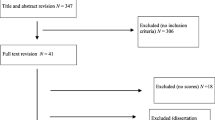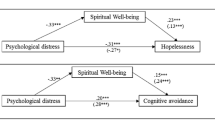Abstract
A significant relation between religion and better health has been demonstrated in a variety of healthy and patient populations. In the past several years, there has been a focus on the role of spirituality, as distinct from religion, in health promotion and coping with illness. Despite the growing interest, there remains a dearth of well-validated, psychometrically sound instruments to measure aspects of spirituality. In this article we report on the development and testing of a measure of spiritual well-being, the Functional Assessment of Chronic Illness Therapy-Spiritual Well-Being (FACIT-Sp), within two samples of cancer patients. The instrument comprises two sub scales—one measuring a sense of meaning and peace and the other assessing the role of faith in illness. A total score for spiritual well-being is also produced. Study 1 demonstrates good internal consistency reliability and a significant relation with quality of life in a large, multiethnic sample. Study 2 examines convergent validity with 5 other measures of religion and spirituality in a sample of individuals with mixed early stage and metastatic cancer diagnoses. Results of the two studies demonstrate that the FACIT-Sp is a psychometrically sound measure of spiritual well-being for people with cancer and other chronic illnesses.
Similar content being viewed by others
References
Hummer RA, Rogers RG, Man CB, Ellison CG: Religious involvement and US adult mortality.Demography. 1999,36:273–285.
Musick MA, House JS, Williams DR: Attendance at religious services and mortality in a national sample. Meeting of the American Sociological Association, Chicago, 1999.
Strawbridge WJ, Cohen RD, Shema SJ, Kaplan GA: Frequent attendance at religious services and mortality over 28 years.American Journal of Public Health. 1997,87:957–961.
Koenig HG, Pargament KI, Nielsen J: Religious coping and health status in medically ill hospitalized older adults.Journal of Nervous and Mental Disease. 1998,186:513–521.
Oxman TE, Freeman Jr. DH, Manheimer ED: Lack of social participation or religious strength and comfort as risk factors for death after cardiac surgery in the elderly.Psychosomatic Medicine. 1995,57:5–15.
Brady MJ, Peterman AH, Fitchett G, Mo M, Cella D: A case for including spirituality in quality of life measurement in oncology.Psycho-Oncology. 1999,8:417–428.
Fehring RJ, Miller JF, Shaw C: Spiritual well-being, religiosity, hope, depression, and other mood states in elderly people coping with cancer.Oncology Nursing Forum. 1997,24:663–671.
Holland JC, Passik S, Kash KM, et al.: The role of religious and spiritual belief in coping with malignant melanoma.Psycho-Oncology. 1999,8:14–26.
Mickley JR, Soeken K, Belcher A: Spiritual well-being, religiousness and hope among women with breast cancer.Image: Journal of Nursing Scholarship. 1992,24:267–272.
Matthews DA, McCullough ME, Larson DB, et al.: Religious commitment and health status: A review of the research and implications for family medicine.Archives of Family Medicine. 1998,7:118–124.
Larson DB, Swyers JP, McCullough ME:Scientific research on spirituality and health: A consensus report. Rockville, MD: National Institute for Healthcare Research, 1998.
Koenig HG, McCullough ME, Larson DE:Handbook of Religion and Health. Oxford, England: Oxford University Press, 2001.
Zinnbauer BJ, Pargament KI, Scott AB: The emerging meanings of religiousness and spirituality: Problems and prospects.Journal of Personality. 1999,67:889–919.
Acklin MW, Brown EC, Mauger PA: The role of religious values in coping with cancer.Journal of Religion and Health. 1983,22:322–333.
Smith ED, Stefanek ME, Joseph MV, et al.: Spiritual awareness, personal perspective on death, and psychosocial distress among cancer patients: An initial investigation.Journal of Psychosocial Oncology. 1993,11:89–103.
Yates JW, Chalmer BJ, James P, Follansbee B, McKegney FB: Religion in patients with advanced cancer.Medical and Pediatric Oncology. 1981,9:121–128.
Roof WC:A generation of Seekers: The Spiritual Journeys of the Baby Boom Generation. San Francisco: Harper San Francisco, 1993.
Wuthnow R:After Heaven: Spirituality in America the 1950s. Berkeley: University of California Press, 1998.
Zinnbauer BJ, Pargament KI, Cole B, et al.: Religion and spirituality: Unfuzzying the fuzzy.Journal for the Scientific Study of Religion. 1997,36:549–564.
Paloutzian RF, Ellison CW: Loneliness, spiritual well-being and quality of life. In Peplau LA, Perlman D (eds),Loneliness: A Sourcebook of Current Theory, Research and Therapy. New York: Wiley Interscience, 1982, 224–237.
Sherkat DE: Tracking the “other”: Dynamics and composition of “other religions” in the General Social Survey, 1973-1996.Journal for the Scientific Study of Religion. 1999,38:551–560.
Thomason CL, Brody H: Inclusive spirituality.The Journal of Family Practice. 1999,48:96–97.
Cotton SP, Levine EG, Fitzpatrick CM, Dold KH, Targ E: Exploring the relationships among spiritual well-being, quality of life, and psychological adjustment in women with breast cancer.Psycho-Oncology. 1999,8:429–438.
Cella DF, Tulsky DS, Gray G, et al.: The Functional Assessment of Cancer Therapy (FACT) Scale: Development and validation of the general measure.Journal of Clinical Oncology. 1993,11:570–579.
Cella D, Hernandez L, Bonomi AE, et al.: Spanish language translation and initial validation of the Functional Assessment of Cancer Therapy quality-of-life instrument.Medical Care. 1998,36:1407–1418.
Fitchett G, Peterman AH, Cella D:Spiritual beliefs and quality of life in cancer and HIV patients. Presentation at World Congress of Psycho-Oncology. New York: October 1996.
Zubrod CG, Schneiderman M, Frie III E, et al.: Appraisal of methods for the study of chemotherapy of cancer in man: comparative therapeutic trial of nitrogen mustard and triethylene thiophosphoramide.Journal of Chronic Diseases. 1960,11:7–33.
Strahan T, Gerbasi KC. Short homogeneous versions of the Marlowe-Crowne Social Desirability Scale.Journal of Clinical Psychology. 1972,28:191–193.
Crowne DP, Marlowe D: A new scale of social desirability independent of psychopathology.Journal of Consulting Psychology. 1960,24:349–354.
Fraboni M, Cooper D: Further validation of three short forms of the Marlowe-Crowne scale of social desirability.Psychological Reports. 1989,65:595–600.
Lara-Cantu MA, Suzan-Reed M: The Crowne and Marlowe Social Desirability Scale: A psychometric study [Spanish].Salud Mental. 1988,11:25–29.
McNair DM, Lorr M, Droppleman LF:EdITS Manual for the Profile of Mood States. San Diego, CA: Educational and Industrial Testing Service, 1992.
Peterman AH, Fitchett G, Cella D:Modeling the relationship between quality of life dimensions and an overall sense of well-being. Presentation at World Congress of Psycho-Oncology. New York: October 1996.
McCullough ME, Larson DB: Religion and depression: A review of the literature.Twin Research. 1999,2:126–136.
Chatters LM, Levin JS, Taylor RJ: Antecedents and dimensions of religious involvement among older Black Americans.Journal of Gerontology. 1992,47(Suppl.):S269-S278.
Holland JC, Kash KM, Passik S, et al.: A Brief Spiritual Beliefs Inventory for use in quality of life research in life-threatening illness.Psycho-Oncology. 1998,7:460–469.
Reker GT:The Life Attitude Profile-Revised (LAP-R) Procedures Manual: Research Edition. Peterborough, Ontario, Canada: Student Psychologists Press, 1992.
Gorsuch RL, McPherson SE: Intrinsic/Extrinsic measurement: I/E-revised and single-item scales.Journal for the Scientific Study of Religion. 1989,28:348–354.
Thoresen CE: Spirituality and health: Is there a relationship?Journal of Health Psychology. 1999,4:291–300.
Levin JS, Taylor RJ, Chatters LM: Race and gender differences in religiosity among older adults: Findings from four national surveys.Journals of Gerontology. 1994,49(Suppl.):S137-S145.
Author information
Authors and Affiliations
Corresponding author
Additional information
This research was supported by Grant No. 5 R01 CA61679 from the U.S. Public Health Service (National Cancer Institute) and by an unrestricted educational grant from Ortho-Biotech, Inc.
We thank Helen Albrecht Morrow and Marla Moss Avery for their invaluable administrative assistance with this article.
About this article
Cite this article
Peterman, A.H., Fitchett, G., Brady, M.J. et al. Measuring spiritual well-being in people with cancer: The functional assessment of chronic illness therapy—spiritual well-being scale (FACIT-Sp). ann. behav. med. 24, 49–58 (2002). https://doi.org/10.1207/S15324796ABM2401_06
Issue Date:
DOI: https://doi.org/10.1207/S15324796ABM2401_06




